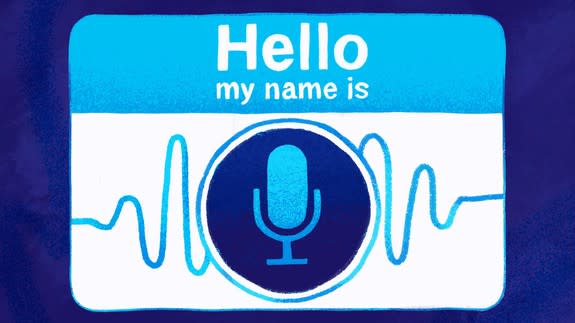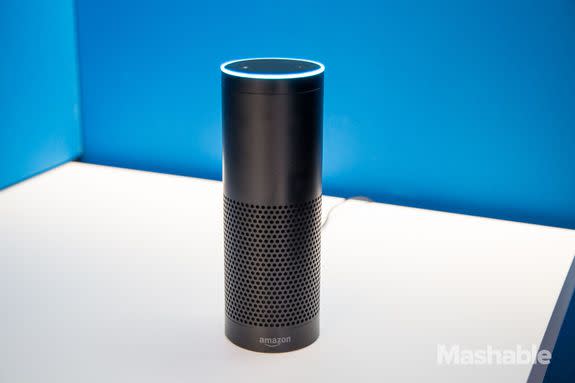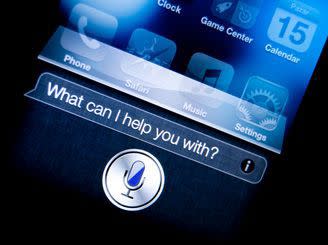Hey, Siri: How'd you and every other digital assistant get its name?

Siri. Alexa. Google. Cortana. The digital assistants created by the largest tech companies in the world have become such a big part of our everyday lives, you may have never considered why we call them the names we do.
But the stories behind these names are more complex than you might think.
SEE ALSO: Samsung might have just confirmed Bixby, the next ridiculously-named AI assistant
In almost every case, other names were considered and, often, preferred. Cortana was almost called Alyx, Steve Jobs didn't like the name Siri, and if Jeff Bezos had had his way, you'd be calling your Echo "Amazon" instead. The reason why names like Siri, Cortana and Alexa prevailed often had more to do with chance and circumstance than a particular engineering or marketing decision.
What's in a name, anyway
When a tech company is looking to name a digital assistant, it examines several things. You want a name that's unique enough to stand out but easy to remember.
In the case of voice-activated assistants, the name needs to be easy to pronounce but not so common that it will be triggered unintentionally.
It also needs to sound unique enough that it will stand out from other speech, even when spoken by mumblers, whisperers and accented voices. (The "x" in the middle of Alexa and the three-syllable cadence of "Cor-tan-a" are particularly useful in this regard.) And, finally, it needs to fit in with the company's brand, or the brand they are trying to create.
All of these assistants also share another characteristic: They all have female voices, at least by default. Some experts say it's because female voices sound more pleasing while the more cynical among us note that the idea of a female assistant plays into existing gender stereotypes rather nicely. Controversial though both claims may be, it's clear that female voices are so far the industry standard for assistant personas.
What follows is by no means an exhaustive look at every assistant. If Amazon, Apple, Google and Microsoft have set the standard for what assistants can be, there is a whole new generation of digital helpers waiting for primetime.
Samsung, which acquired Siri creators' startup Viv, is rumored to have a new assistant name Bixby. Nokia may be working on its own assistant named Viki and Facebook is working on an assistant named "M", which only a few Facebook users have access to. There are also dozens of startups that are working on helpers of their own. But all of these owe at least a little something to the assistants that came before them.
Alexa
Before Alexa ever had a final name, the original inspiration for the assistant came from science fiction. The goal, according to David Limp, the senior vice president at Amazon overseeing Alexa, was to create a device able to "replicate the Star Trek computer," which could respond to any command.
The roots of the Alexa name itself, however, go back much farther than Star Trek. The name, Limp says, was also meant to evoke the legendary Library of Alexandria from ancient Egypt.
Still, it took awhile before everyone was onboard with the name.

Image: Jhila Farzaneh/mashable
"We did go through a number of names," Limp said during the Fortune Brainstorm Tech conference last year, adding that it was an important choice because it helps build a personality for formless AI.
The name, which Limp says has no connection to the analytics company of the same name Amazon acquired in 1999, also works for other reasons.
"There's computer science behind it, too ... it only wakes up when it hears the word 'Alexa,' and the phonics of that word and how that word is parsed and the fact that it has a hard consonant with the X in it, is important in making sure that it wakes up only when it's asked for."
Alexa is also unique in that it's one of the more "human-sounding" names of the digital assistant world. In fact, Amazon may be at least indirectly responsible for the name's increasing popularity. According to the Social Security Administration, the name "Alexa" ranked 32 on its list of the 1,000 most popular names in 2015 — up from 63 the year before — with 6,029 newborns sharing a name with Amazon's assistant.
This, of course, can also be problematic for people named Alexa (or who have pets named Alexa), which is why Amazon allows two other "wake words" to be used: Amazon or Echo. ("Amazon" was also the wake word originally favored by CEO Jeff Bezos, according to Bloomberg, though the company's engineers — worried the device would be set off by ads on TV and conversations about Amazon — convinced him "Alexa" was a better choice.)
Siri
The most famous of the digital assistants, Siri, and the history of Apple's storied helper is, by now, well-known. Originally created as part of a massive AI project within DARPA's PAL (Personalized Assistant that Learns) initiative, Siri was spun out from the research institute SRI International in 2007.
It soon caught the attention of Steve Jobs and Apple acquired the company in 2010.
But the story of the Siri name dates back to the company's early days as a startup.

Image: SRI
"As a startup, when coming up with Siri's name, we wanted something that was easy to remember, short to type, comfortable to pronounce, and a not-too-common human name. And we wanted to be able to get the domain name for not too much money," Siri cofounder Adam Cheyer, recalled in a post on Quora.
Siri's Norwegian CEO Dig Kittlaus apparently was also a fan of the name because it meant "beautiful woman who leads you to victory" in Norse. Cheyer liked that it was Swahili for "secret," as the company spent quite a bit of time in "stealth" mode. Others thought it was a nice nod to the company's roots at SRI.
But not everyone was so easily won over.
Jobs reportedly disliked the name Siri and only kept it because his team couldn't agree on a better alternative.
"It was all a big surprise for the team that Apple decided to keep the original Siri name for its launch as part of iOS. There were other candidates that were leading, up until the final weeks," Cheyer says.
Cortana
Microsoft's assistant was never really meant to be named Cortana at all. At least, not permanently. Made famous by the AI assistant character of the same name in Halo, Cortana was simply the internal codename given to the project in its earliest days.
"It was just a codename to begin," recalls Deborah Harrison, an early member of Cortana's editorial team. "Codenames don't tend to be the ones that ship."
Then, as so many "secret" projects eventually do, Cortana leaked. The company, which up until then had given many of its new products rather bland names, got "an unexpectedly warm response to the idea of a digital assistant named Cortana from the people who were familiar with the game," Harrison tells Mashable.

Image: microsoft
In fact, the fans loved the name so much they petitioned Microsoft to keep it. "People are actually willing to buy a Windows Phone if the Personal Assistant is named Cortana," it read.
Harrison notes the name also worked for other reasons. "We were looking for something that had the correct cadence for recognition, so that when you say the name the system can easily understand it and distinguish it from other words you might be saying."
Cortana fit the bill in that regard as well.
And so Microsoft relented but only after first considering Naomi, Alyx and a few other names. The company says it didn't finalize the name until a few weeks before Cortana made her public debut in April 2014.
Google Assistant
Google's Assistant (and, previously, Google Now) stands out in that it bucks the trend of giving digital helpers human-sounding names. Instead, its assistant is simply "Google."
That may seem bland or unoriginal but it's part of a much bigger strategy. With its assistant, the company wants to emphasize its own services and technology, not the concept of an assistant itself. It prefers people to think of its assistant as an extension of its search engine and other products, rather than a separate product with its own "personality."

Image: Google
"We're calling this your Google Assistant because we fundamentally think of it as an extension and evolution of Google itself, not so much as a new, separate product," a Google spokesperson tells Mashable.
Instead, the assistant, which lives in the company's Google Home speaker, Pixel phones and its messaging app Allo, is meant to be be a hyper-personalized and extra helpful version of the Google services you already use. "Your own personal Google" as the company's tagline says.
